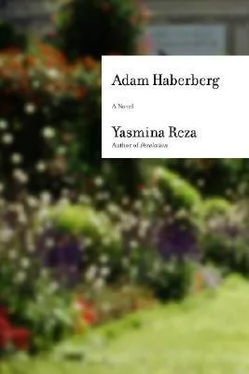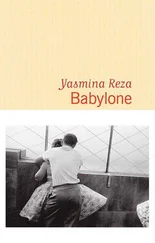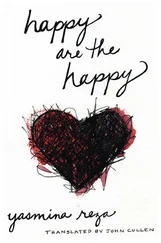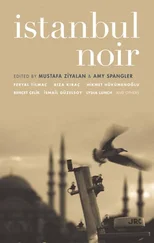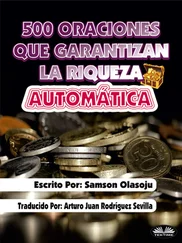“Let's go in,” says Marie-Thérèse.
He follows her. As she walks she jingles her keys. They make their way into the white apartment block. They make their way into the elevator. He sees himself in the mirror, holding the package from the pharmacy.
Marie-Thérèse opens the door to her apartment. She switches on the light. She hangs up her coat and scarf and says, Make yourself comfortable. She switches on a lamp on a low table that has an Oriental look. There's a sofa and an armchair, the floor is linoleum, Adam notes. At the end of the room a French door opens onto a balcony, beyond it the lake. Marie — Thérèse says, should I turn up the heat?
“If you like.”
She goes into the kitchen and switches on the lights— it's a long, narrow room with a window at the far end. She turns on the boiler, tears off a paper towel, and blows her nose. Adam is still standing in the living room in his coat. We'll have a pick-me-up she says, opening a cupboard, a Pernod, a drop of cherry liqueur?
“OK. A drop of cherry liqueur.”
Adam sits down in the armchair. Do I drink my Veinamitol before the cherry liqueur? he thinks. I'd have got it out of the way then, he thinks, but on the other hand, wouldn't the immediate intake of alcohol risk vitiating the effects of the Veinamitol? Shouldn't I leave a space between the Veinamitol and the alcohol, the way you're supposed to do with aspirin and antibiotics? Drink the cherry liqueur, he thinks, warm yourself up with the cherry liqueur and swallow your Veinamitol later, in a neutral context. Marie-Thérèse comes in with a tray on which there are glasses and a saucer of Tue savory crackers. Take your coat off, she says, I've just turned up the heat! Unless, thinks Adam, I were to drink the Veinamitol right away and then eat a handful of crackers as filling before the cherry liqueur. Would you have a glass of water, Marie-Thérèse?
“Yes, if you take your coat off. It's all wet anyway.” Adam removes his coat. Marie-Thérèse goes to hang it up and returns with a glass of water. What's that? she says, watching him empty the packet into the glass.
“A thing for the circulation.”
“You have a circulation problem?”
“It's not serious.”
“Five drops of essential oil of garlic, plus two drops of lemon essence, three times a day.”
“Really?”
“You can mix it with anything you like, honey, soft bread, or water.”
“What does it do?”
“It regulates the circulation. It stabilizes hypertension.”
“It acts on the blood vessels?”
“Of course.”
“It strengthens them?”
“It strengthens everything.”
Adam drinks the Veinamitol and takes a Tue. Marie-Thérèse has gone off into the kitchen. She returns with a colander, some newspaper, and some potatoes. Adam eats the Tue and she peels the potatoes, while taking sips of cherry liqueur. She's got no neck, he thinks, is it because she's all hunched over to do the peeling? Oh, my glasses! she exclaims, I'm forgetting my glasses. She laughs, getting up and rummaging in her bag. How do I look? Awful? A hundred years old?
“Not at all. Fine. They suit you fine.”
“Goodness, I look a bit like Madame Demonpion!” she says, looking at herself in the hall mirror.
“Who's that?”
“Demonpion, our history and geography teacher.”
“I don't remember her.”
“Oh yes, you know, Demonpion: plus ça change et plus c'est la même chose.”
“I don't remember.”
“Have you seen anyone again? Have you seen Tristan?” she asks, getting back to her peeling.
“I've not seen anyone.”
“Neither have I, apart from Alice. And Tristan at the time of Alice's death. Since then I don't know what's become of him. At one time he had a kind of graphics outfit or something like that. Do you remember Gros-Dujarric? He did the Twingo campaign.”
“I don't remember.”
“He lived in the same building as Alice in the Hocquettes apartment complex. There were three of us in the class from the Hocquettes. I can see better with these glasses, it's a shame to admit it but I can see better with these glasses. Do you want onions, would you like me to add onions? I can make it with or without onions.”
“Whatever you like.”
“No, you tell me what you prefer.”
“Add an onion.”
“It improves it but there are people who don't like onions. Do you cook?”
“Yes.”
“What do you do that's good?” she says from a long way off, peeling the onion under the tap at the sink.
“Pasta.”
“What kind of pasta?”
“All kinds.”
“Italian style?”
“Yes. I do risotto as well.”
“I adore risotto. You must make me a risotto one
day.”
“Yes.”
She slices the potatoes, tosses the onion into a frying pan, and returns to sit down facing him. And your wife, does she cook? she says. “Not a lot. She doesn't have time.” “What does she do?” “She's an engineer.”
“In what specialty?”
“Telecommunications.”
Marie-Thérèse falls silent. She lowers her eyes and seems to be meditating on this reply. She polishes her spectacles with the cloth and puts them back in their case. The onion sizzles in the frying pan. She gets up to turn down the heat. She adds the potatoes, turns up the power in the exhaust fan, and leaves the kitchen, closing the door.
Marie-Thérèse and Adam sit facing each other. Without the background light from the kitchen the room has taken on the semblance of an empty space. On the low table, apart from the tray she's just brought in, there's a flower in a pot. When the daylight fades, Goncharki had said one day at his house, I don't get up to light the room. I don't switch on anything, I let things take on the semblance of shadows and if I'm doing something I continue doing what I was doing in the dark. Is it quiet in Viry? says Adam, after a long silence.
“Oh yes it's quiet,” she says.
“What's it like?”
“Nothing much. Viry's neutral, it's not much of a place.”
Help me, my God, he thinks, to transmute life into literature! To transmute Marie-Thérèse, the linoleum floor, the Tucs, the gloomy light, to transmute Viry and all the years into literature. I have no greater wish. I offer up this prayer as I swallow a mouthful of cherry liqueur: grant me the power to exist in spite of and beyond reality. Until now I've not been sincere, as you well know, I always wanted to be loved and praised, I wanted to be somebody , my God. I've played at being arrogant, a naysayer. What I wanted, and I laugh at the phrase, was to occupy a place in our time. Of all that I've written, the only thing I have any affection for is The Black Prince of Mea-Hor , my one book devoid of vanity. You see me tonight, seated in this living room in Viry-Châtillon, observing the configuration of the furniture, waiting with Marie-Thérèse Lyoc for time to pass. A switched-off television on a television table: a combination you could find in a hotel room. A set of shelves with CDs, a few books and some photos on them, a sideboard adapted to house hi-fi equipment, a Moroccan cushioned footstool. A Bonnard picture on the wall, a reproduction on paper in a red frame. A woman pouring a cup of tea for a dog that sits upright and obedient at the table, waiting to be served. Here, where nothing is happening, in the absence of any physical body, I feel more disoriented than in the real world, which is, as I heard a commentator on the radio put it, in chemical precipitation. I think about my age and the seconds slip away into the void. Help me, God, to capture all this for the simple comfort of feeling I'm alive. Do you smoke? says Marie-Thérèse.
“No.”
“Do you mind if I smoke? I hardly smoke at all during the day but in the evening I enjoy it.”
Читать дальше
